Many anxious artists and songwriters have competed in the Eurovision Song Contest, but few have stayed for a decade, let alone several. They instead have either gone on to superstardom or back to relative obscurity. Those who have stuck through ESC thick and thin, however, are widely revered by Eurovision fans. Chief among them is Germany’s Ralph Siegel—the grandfather of Eurovision and an all-around fabulous composer. Today, as Ralph celebrates his 69th birthday, we salute him! Below you can watch our interview with Ralph in Copenhagen earlier this year, followed by a retrospective of his career. Ralph, thank you for all of the music!
Ralph Siegel interview at Eurovision 2014
From Humble Beginnings
Ralph Siegel started his career in the contest in 1972, when three of his songs competed in the national final to represent his native Germany. None of them won that year, meaning he would have to try again in 1973. However, he did not send any songs to the national final that year, and waited until 1974 to début in the big leagues. The song he wrote, “Bye Bye I Love You” by Irene Sheer, placed 4th for Luxembourg while Sweden’s ABBA took the trophy.
http://youtu.be/8DFn32jz_Bs
The next year, “Alles geht vorüber” placed second in the national final for Germany, which albeit being a better result for Ralph Siegel than before, meant that he wouldn’t represent his homeland until the next year. His first German entry in Eurovision, “Sing Sang Song”, placed a lousy 15th in 1976.
http://youtu.be/ln4AWfesrKM
Three years later, he sent two songs to the German national final. One of them, “Ein blick sagt mehr als jedes wort”, placed 12th (probably because no one could remember the title), but another “Dschinghis Khan” gave Siegel his second win in the German national final. In Jerusalem, the song placed only 4th, but it still one of the contest’s most memorable performances from the earlier times.
http://youtu.be/4pIc6-vO1l4
Movin’ On Up
The eighties is when Ralph Siegel hit his big Eurovision break. In fact, the year after the Siegel-led overly-camp Mongolian invasion of Eurovision, the man had two songs competing for different countries. Not one to abandon the country that led him to Eurovision fame, he wrote the Luxembourgish entry “Papa Pingouin” (9th place), and for his homeland, “Theater” (the silver medal winner).
http://youtu.be/9_RDzyncNgU
Two years later, he finally hit the jackpot with Nicole’s “Ein bisschen Freiden”. The seventeen-year-old’s victory would be the first and only for Siegel’s long-competing homeland until the adorable Lena snagged the victory in 2010 (the first ‘Big 5’ victory since the United Kingdom’s victory in 1997!).
http://youtu.be/GvD8Y6gr9lk
Half a decade after he and Nicole took the contest to Cologne, he wrote “Lass die Sonne in dein Herz” for the band Wind. It was his third silver medal.
http://youtu.be/3Tl_74e3NSk
Although this was his most productive decade (with 7 entries in the contest and 15 national final songs), it was also marred by scandal. The singers of the aforementioned “Papa Pingouin”, Sophie & Magaly, only received a small percentage of the sales from their entry. Ralph Siegel then dropped his partnership with the girls, but not before another one of their songs sold poorly. It was revealed later on that he had no intention of making the girls superstars, and that they were merely used for the one song out of necessity.
Ralph Siegel Slows Down
By the nineties, Siegel had started to slow down. The fads were changing, and he let the newer songwriters take over. Still, he wouldn’t leave his beloved contest without at least some music. Ralph Siegel wrote only five entries for the contest that decade (all for Germany), two of which placed third (Mekado’s “Wir geben ‘ne Party” and Sürpriz’s “Reise nach Jerusalem – Kudüs’e seyahat”).
In addition, he wrote five entries for the German national final (one each in 1996 and 1997, and three in 1998) and wrote an entry for Switzerland that was later disqualified (Geraldine Olivier’s “Soleil, soleil”). One of his old acts, Wind, tried their hand at the contest again in 1992, but sadly only placed 16th with “Träume sind für alle da”.
Stuck In A Rut
At the turn of the century, it seemed as if all of Germany was sick of Ralph Siegel. His 1980’s tastes could no longer satisfy the land of bratwurst and beer. Still, he insisted on sending at least a few more entries for his home. He firstly sent “I Can’t Live Without Music” with singer Corinna May, which placed 21st. This was his lowest score yet.
He decided to go out with a bang and make his last hurrah in the form of “Let’s Get Happy”, an extremely colorful retro number with an eccentric singer, bell bottoms, and messages of peace.
After Lou placed 11th in Riga, Ralph Siegel decided to move on to another country. From 2004 to 2009, he sent a slew of entries to the sunny island of Malta for their national final. Malta wasn’t overly receptive to the veteran songwriter, though. His highest placement in the Maltese national final was 4th, with Keith Camilleri’s “Sunshine in Your Eyes”.
He got two more entries into the big arena before the end of the century, though. The pseudo-Swiss supergroup six4one enlisted him to write their entry “If We All Give A Little”, while Montenegrin Andrea Demirovic performed the disco number “Just Get Out of My Life“. Judging from this decade, Ralph Siegel was certainly behind the times, and it would take a miracle for him to find success again.
A Glimmer of Sammarinese Light
While waiting for his big comeback, Ralph Siegel wrote an old-style ballad titled “C’était ma vie” for the first winner of the contest, Lys Assia. It competed in the Swiss national final in 2012 but placed only 8th. The next year, Lys collaborated with rapper group New Jack and this led Ralph to his first hip-hop entry, “All In Your Head“. This was not selected by the German-language broadcaster.
http://youtu.be/YWUW-jXOSPs
The tiny microstate of San Marino had internally selected jazz singer Valentina Monetta to represent them in the 2012 contest by this time. SMRTV hired Ralph Siegel in what would become a three-year partnership between him and Monetta. Although most of you Eurovision fans know how this went down at this point, let’s do a quick summary:

The first Monetta-Siegel entry, “The Social Network Song”, was bombed by critics and fans. It was hilariously bad, y’all (although it still ranked seriously high with the Wiwi Jury)!
In Malmö, the duo presented the bipolar “Crisalide (Vola)“. Although it was a high fan-favorite, it still didn’t qualify for the final. Monetta was announced to be the representative for a third time soon after the contest ended.
This year, in Copenhagen, the duo composed “Maybe (Forse)“. Exactly forty years after his first Eurovision entry, he stepped onto the Eurovision stage in order to accompany the song on piano. It is thought that he was Valentina’s good luck charm, after all, she qualified for the final (San Marino’s first time). Although the entry only placed twenty-fourth, it was certainly a huge accomplishment for the slightly-outdated but veteran composer.
Ralph Siegel, we salute all of your hard work. The contest would be certainly different without you!
List: Ralph Siegel’s Contributions To Eurovision
1972
German National Final
“Hallelujah Man” – Marion Maertz (unplaced)
“Mein Geschenk an dich” – Adrian Wolf (unplaced)
“Meine Liebe vill ich dir gebe” – Edina Pop (unplaced)
1974
Eurovision Song Contest
“Bye Bye I Love You” – Luxembourg – Ireen Sheer (4th)
1975
German National Final
“Alles geht vorüber” – Peggy March (2nd)
1976
Eurovision Song Contest
“Sing Sang Song” – Germany – Les Humphries Singers (15th)
1979
Eurovision Song Contest
“Dschinghis Khan” – Germany – Dschinghis Khan (4th)
German National Final
“Ein blick sagt mehr als jedes wort” – Gebruder Blattschub (12th)
1980
Eurovision Song Contest
“Theater” – Germany – Katja Ebstein (2nd)
“Papa Pingouin” – Luxembourg – Sophie & Magaly (9th)
German National Final
“Pan” – Costa Cordalis (2nd)
1981
Eurovision Song Contest
“Johnny Blue” – Germany – Lena Valaitis (2nd)
German National Final
“Mannequin” – The Hornettes (2nd)
1982
Eurovision Song Contest
“Ein bisschen Frieden” – Germany – Nicole (1st)
German National Final
“Peter Pan” – Paola (2nd)
“Blue-Jeans-Kinder” – Marianne Rosenberg (8th)
1984
German National Final
“Tingel Tangel Man” – Harmony Four (3rd)
1985
Eurovision Song Contest
“Children, Kinder, Enfants” – Luxembourg – The Internationals (13th)
German National Final
“Die Glocken von Rom” – Heike Schafer (2nd)
“Grün Grün Grün” – Caro Pukke (4th)
1986
German National Final
“Wir gehör’n zusammen” – Dschinghis Khan Family (2nd)
“Die Engel sind auch nicht mehr das was sie war’n” – Chris Heart & Band (3rd)
“Clowns” – Clowns (6th)
1987
Eurovision Song Contest
“Lass die Sonne in dein Herz” – Germany – Wind (2nd)
German National Final
“Frieden fur die Teddybärn” – Maxi & Chris Garden (2nd)
“Aus” – Cassy (7th)
1988
Eurovision Song Contest
“Lied für einen Freund” – Germany – Maxi & Chris Garden (14th)
German National Final
“Tanzen geh’n” – Tammy Swift (7th)
1989
German National Final
“Ich hab’Angst” – Dorkas (3rd)
1990
Eurovision Song Contest
“Frei zu leben” – Germany – Chris Kempers & Daniel Kovac (9th)
1992
Eurovision Song Contest
“Träume sind für alle da” – Germany – Wind (16th)
“Soleil, soleil” – Switzerland – Geraldine Olivier (DQ)
1994
Eurovision Song Contest
“Wir geben ‘ne Party” – Germany – Mekado (3rd)
1996
German National Final
“Echoes” – Angela Wiedl & Dalila Cernatescu (3rd)
1997
Eurovision Song Contest
“Zeit” – Germany – Bianca Shomburg (18th)
German National Final
“Engel” – All About Angels (7th)
1998
German National Final
“Can Can” – Ballhouse (6th)
“Carneval” – Köpenick (7th)
“Kids” – Sharon Baruner (8th)
1999
Eurovision Song Contest
“Reise nach Jerusalem – Kudüs’e seyahat” – Germany – Sürpriz (3rd)
2000
German National Final
“I Believe in God” – Corinna May (2nd)
2001
German National Final
“Happy Birthday Party” – Lou & Band (3rd)
“A Song for our Friends” – German Tenors (4th)
2002
Eurovision Song Contest
“I Can’t Live Without Music” – Germany – Corinna May (21st)
2003
Eurovision Song Contest
“Let’s Get Happy” – Germany – Lou (11th)
Austrian National Final
“This Night Should Never End” – Petra Frey (2nd)
2004
Maltese National Final
“It’s a Wonderful Life” – Ali & Lis (5th)
2005
German National Final
“A Miracle of Love” – Nicole Sussmilch & Marco Matias (2nd)
Maltese National Final
“Sunshine in Your Eyes” – Keith Camilleri (4th)
“Addio, Ciao” – Aldo Busuttil (5th)
“The Angels Are Tired” – Manuel (7th)
“Don’t Stop the Party” – Ali & Lis (8th)
“He” – Eleanor Cassar (10th)
“Time to Fall in Love Again” – Louisanne Tate (14th)
2006
Eurovision Song Contest
“If We All Give a Little” – Switzerland – six4one (16th)
2009
Eurovision Song Contest
“Just Get Out of My Life” – Montenegro – Andrea Demirovic (11th in semi-final)
Maltese National Final
“Tonight at the Opera” – Classic Rebels (5th)
“Innocent Heart” – Ruth Portelli (eliminated in semi-final)
“Blame it on Your Heart” – Ruth Portelli (eliminated in semi-final)
2010
Irish National Final
“Rivers of Silence” – Lee Bradshaw (5th)
2011
Maltese National Final
“I’ll Follow the Sunshine” – Domenique Azzopardi (24th)
Moldovan National Final
“This is My Life” – Valeria Tarasova (7th)
Portuguese National Final
“Não estamos sós” – Emanuel Santos (20th in online wildcard)
2012
Eurovision Song Contest
“The Social Network Song” – San Marino – Valentina Monetta (14th in semi-final)
Moldovan National Final
“Save a Little Sunshine” – Irina Tarasiuc & MC Gootsa (6th)
Swiss National Final
“C’était ma vie” – Lys Assia (8th)
Ukrainian National Final
“Mondo blu” – Oksana Nesterenko (3rd)
2013
Eurovision Song Contest
“Crisalide (Vola)” – San Marino – Valentina Monetta (11th in semi-final)
Swiss National Final
“All in Your Head” – Lys Assia feat. New Jack (eliminated in online wildcard)
2014
Eurovision Song Contest
“Maybe (Forse)” – San Marino – Valentina Monetta (24th)
Swiss National Final
“Over the Limit” – Edona Gjinaj (eliminated in online wildcard)
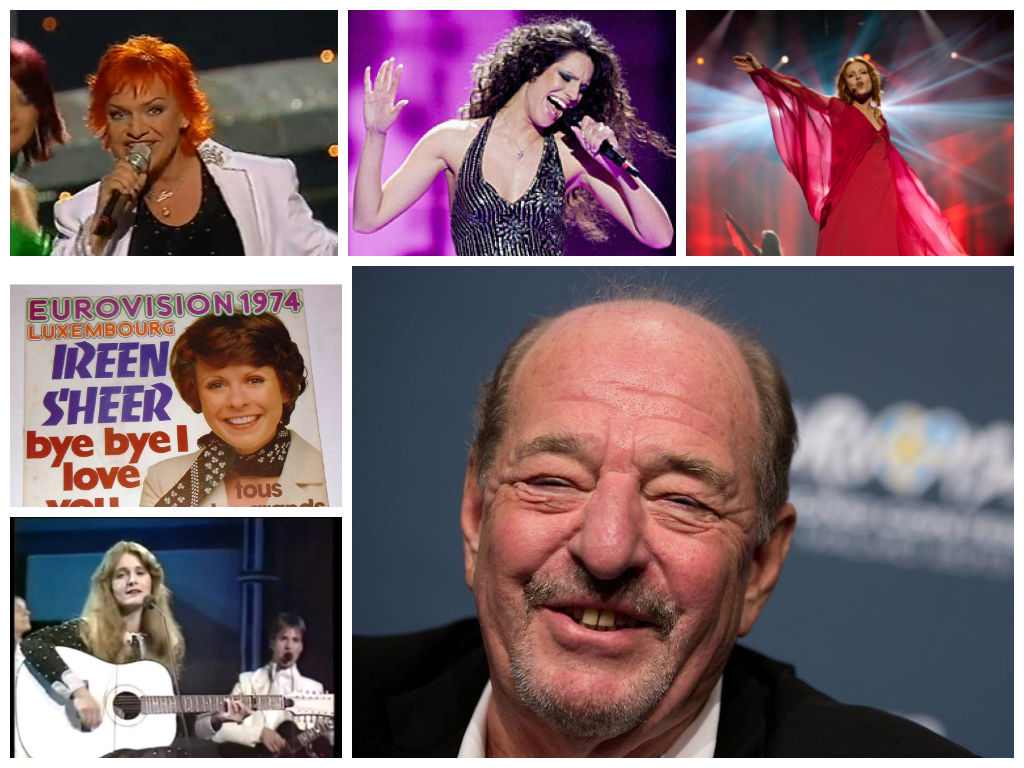
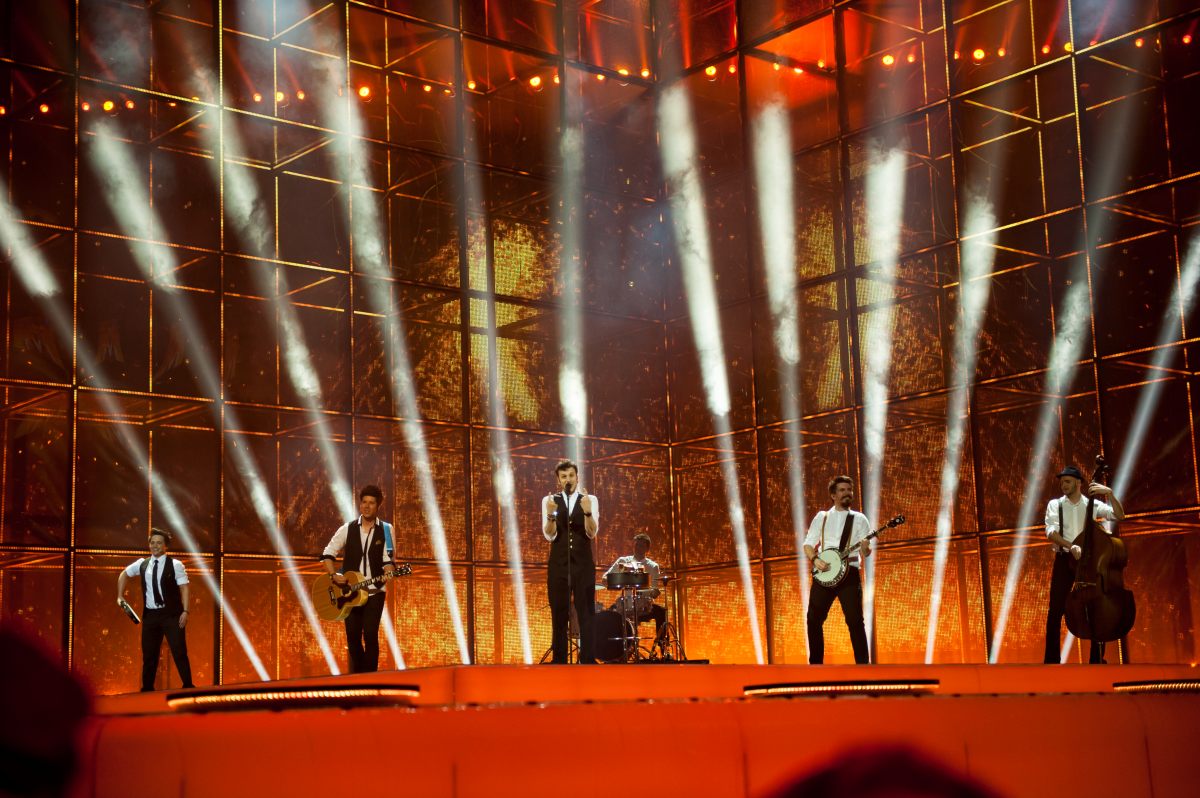


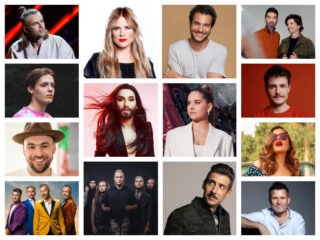

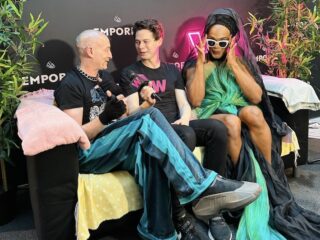

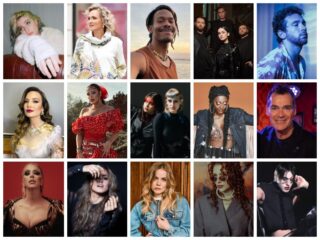

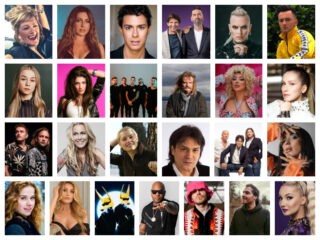
1987 German national final Sandy Derix – Träume tun weh
I think Siegel wrote song for The Hornettes at Austrian national final 1983 where they finsihed 3 rd with song Hello Mr Radio.
Glückwünsch …. even though the only entry he ever did I actually really liked is the one from 1994 … but definitively none by Valentina …
Fun fact: the song he sent to the 2011 Maltese NF was eventually covered by Valentina Monetta and included in her album, La Storia di Valentina Monetta 🙂
Happy Birthday Ralph, may you continue to contribute more good songs to the Eurovisions to come!
Cool! Happy birthday, Ralph!